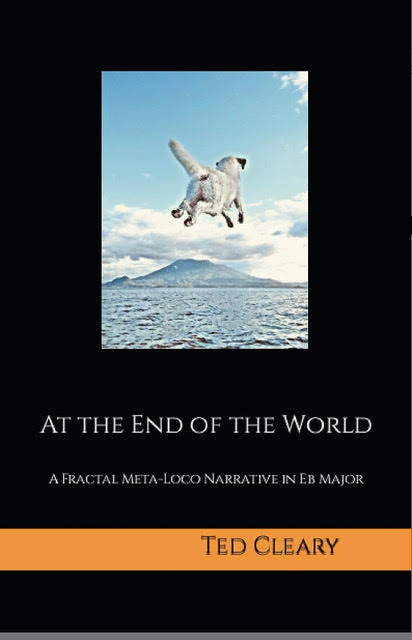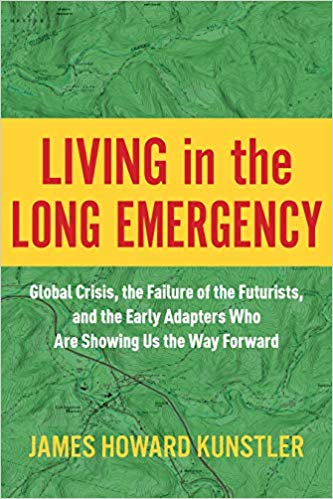Paper Delivered at the
Congress for the New Urbanism
by James Howard Kunstler
Milwaukee, June 6, 1999
When we set aside all the technical considerations and all the familiar economic arguments and tedious political angles that swirl around this enormous and momentous field of human ecology, we’re left with the question of how it affects our souls. That this question gets such spectacularly short shrift in the public discussion is itself a powerful indictment of our idiot contemporary culture, because what could be of more profound importance to each and every one of us than how we feel about our literal place in the world?
How do we even account for such a fabulous failure of moral imagination?
I believe that there is such a thing as mainstream culture, which changes, mutates, and readapts itself over time in an organic process akin to the way other living systems grow and change. I believe that in the past and up into our time, American culture has admitted a notion of the human spirit, that such a thing exists and is worthy of our attention. We know this from reading Emerson, Thoreau, Lincoln, Whitman, Santayana, Mumford, Flannery O’Conner, Alan Ginsburg, Annie Dillard, Wendell Berry, and scores of others who were moved to express themselves on the subject. Is there a more potent phrase in our national letters than “the better angels of our nature” invoked by Lincoln.
I don’t think there can be any doubt that the issues of the human spirit have been embedded in our national habits of thinking and that, at one time or another, they occupied a broad band in the mainstream. But what is it about the particular nature of our time that appears to have suppressed them, tried to vanquish them, or driven them to the margins of our collective psychology?
My sense is that American culture has an unfortunate tendency toward abstraction, and where the idea of the human spirit meets the issues of place, this tendency becomes very troublesome because this is exactly where the abstract collides with the concrete. The situation is badly aggravated by those professional agents of untruth, the corporate advertisers, marketers, and spin-doctors who bombard the populace with so many deliberately false messages that language itself loses its vested authority as the best medium for an honest understanding of the real world. Professional intellectuals (especially academics) have ceded the moral ground as defenders of reality by adopting the same despicable tactics as the advertisers and spin doctors in trying to advance a wishful politically leveling view of the world that does not comport with organizing principles of nature, which tend to be hierarchical. Abstraction, therefore, becomes a refuge for those who fear the actual nature of things. (That it is tragic when intellectuals surrender this ground is another matter.)
What we’ve gotten in America the past several generations is some very very bad, very untruthful ideas about the nature of reality, among them: that there may not indeed be any such thing as objective reality, that the virtual is an adequate substitute for the authentic; that the abstract is identical to the particular (i.e. that the idea of something counts as much as the thing itself); that wishing is the same as doing; that nothing is inherently better than any other thing; that all behaviors, values, attitudes, undertakings, and aspirations are equally valid (and equally provisional).
But what could be more concrete than a particular spot on the planet, its specific quality and character in relation to our experience of that place, including our memories of the past there and our hopes and expectations about the future there? For most of modern history – that is, since men gave up a nomadic existence for a settled one – this complex of ideas and emotions has been bundled into the notion of a place called home.Of course, in contemporary American culture, where every mass-produced vinyl box is called a “home” – whether it possesses any of the real qualities that define the nature of a home – it becomes impossible to endow any place with meaning, or conduct an intelligible conversation about it.
The deliberate, relentless perversion of truth and truthfulness in our culture has prompted us to give ourselves permission to create a human ecology that is, for practical purposes, the anti-place. It is the dwelling place of untruth. We call it suburbia. A cartoon of rural life, with none of the qualities of it. I believe we in the CNU recognize its profound culturally toxic nature, and yet it has become as commonplace as the fog of lies and propaganda that envelopes us, and we cannot quite believe that something so ubiquitous can be so deeply, thoroughly evil.
The school massacre at Littleton, Colorado, just over a month ago is a case in point. Notice how the nation went through a highly ritualized act of national handwringing while evincing a shocking inability to examine the nature of the place where the deed occurred in relation to the deed itself, or the relation of the place, the deed, and the spirits of the young people who lived in the place and carried out the deed. None of this was difficult to understand, either. We just didn’t want to look.
I’ve been to Littleton, and this is what you get there: a place with no sense of a past, no hope of a future, and a spiritually degrading present. The common complaint about these brand-new mega-suburbs is that “everything looks the same.” This is only the most superficial symptom of their evil nature. Not only is everything the same in Littleton as in thousands of other anti-places created in the name of prosperity and economic expansion, but the components of this massive sameness have in common their nature as a massive cultural swindle, resulting in an ecology of lies. The chief lie concerns our relation to the passage of time.
There is nothing more fundamental to the nature of reality, and to the role of humans within it, than the continuity of life through time; that things, events, and personalities came before us and made way for us, as we will have to make way for new things, events, and personalities, with the expectation that across time we will all – the dead, the living, and the unborn – contribute to a chain of being (as Jefferson’s generation called it), in a process of dynamic disequilibrium that adds up to more than the sum of each thing, event, and personality, and supports a unifying quest toward a state of grace.
This is exactly what suburbia, the anti-place, lacks. It is easy to see that there is no past. It might take a little reflection – but not much – to perceive that it has no future. Its present is a dangerously provisional collective hallucination, nourished by a sado-masochistic idiot pop culture, which can fall apart at the slightest provocation. (We have a name for this collective hallucination, by the way: The American Dream, a sort of mega-lie stating that this sort of ghastly provisional collective hallucination is the ultimate state of being worth aspiring to.) I maintain that the provisional order of the anti-place is continually being subverted by an array of logical human responses. Most are self-defense mechanisms of one sort or another. For instance, teen drug use as a social phenomenon exists because the ecology of the anti-place is so deeply unrewarding, corrosive, and degrading that the spirit demands analgesia. Teen drug abuse is really self-medication gone awry. Likewise, teen violence is a logical response to the deep sense of purposelessness generated by the American Dream. Just as young adults begin to acquire some inkling of their physical and mental power as human beings, and lacking any notion as to how these might be used to construct a purposeful life, the kids squander their poorly understood personal power to act in a single reckless act intended to destroy the legitimacy of their everyday environment and everything that it represents.
I doubt that there is anything more malign about the anti-place than its failure to furnish any sense of a future for young people. If anyone needs the signifiers of a hopeful future it is children and teenagers. Since the anti-place is the home of untruth, however, it is perfectly logical that it fails most those young persons which it pretends to serve best. It is especially shameful that adults and professionals insist despite all evidence to the contrary that suburbia, the anti-place is “a great place for kids.” Supporting this lie contributes directly to the slaughter of their own children.
(By the way, wasn’t it horrifyingly embarrassing when, at the start of our air war against the Serbians, American children carried out an effective act of war against their own culture? Fifteen dead, many wounded. How could we explain this to ourselves. We couldn’t. We failed to. We stopped trying eventually because the truth was too painful)
When I say “signifiers,” by the way, I mean that combination of physical artifacts, institutions, and the ideas and feelings invested in them, that traditionally inform people who and where they are in the world, where they’ve come from and where they might be going. For instance, the organic system of authentic village, town, neighborhood, or city contains the requisite organs for assuring the continuity of human life – the civic organs, the commercial organs, the cultural organs, the family organs, and so on. One of the chief characteristics of the anti-place, suburbia, is that it lacks these organs, and therefore is not a living organism existing within a hierarchy of other living organisms – the person, the family, the group, the village, the region, the biosphere, and so on.
The anti-place fails to signify to young people that such a thing as a plausible future exists, so that by utilizing one’s powers of personal sovereignty, one might create a life worth living in a place worth living in. Clearly, the two young men who shot up Columbine high school came from circumstances that seemed to furnish all the requisite advantages for a positive development to adulthood. And what they just as clearly lacked was enough of a sense of a hopeful future to chose any other path besides their own deliberate self-destruction following an orgy of wrathful bloodletting. I don’t think we can over-estimate the depth and degree of anomie breeding in the thousands of anti-places that are designed to the specifications of Littleton, Colorado. By anomie, I mean, according to the dictionary:
- Social instability caused by steady erosion of standards and values.
- Alienation and purposelessness experienced by a person or a class as a result of a lack of standards and values.
- Personal disorganization resulting in unsociable behavior.
If we were truthful and realistic about the way we were living in America, we would expect tragic outbursts like the Columbine massacre at regular intervals, and not be the least bit surprised, nor go through the disingenuous rituals of shock and disbelief. (And, in fact, we have been getting school massacres at regular intervals.) Because we know that we have created a vast and evil setting for American life to take place in.
I often joke that we are a wicked people who deserve to be punished. But the joke is, it’s no joke. I believe it with all my heart. I also often remark in my public utterances that when we succeed in creating enough places that are not worth caring about, that we will succeed in becoming a nation that is not worth defending, and a way of life that is not worth carrying on. We are guilty of foreclosing our own future, and we are evil because we don’t care.
If this is seems like a pessimistic view of the current situation than I congratulate you on your powers of perception.





 JHK’s Three-Act Play
JHK’s Three-Act Play







This is exactly what suburbia, the anti-place, lacks. It is easy to see that there is no past. It might take a little reflection – but not much – to perceive that it has no future. Its present is a dangerously provisional collective hallucination, nourished by a sado-masochistic idiot pop culture, which can fall apart at the slightest provocation. 70-533 braindumps PDF
If you also think that you don’t have any idea how to delete browsing history ?Then come to this website homepage and learn all the simplest process to remove completely your search records and keep your important data and browsing records secure.Thank you so much to this post.
Must be a nice post and full information here click this link windows dvd player is a best online video player and full hd video sport.
Here some school’s incident has been shared so we hope Essay Geeks can be of a great help for us as well. I can look into this and will look forward to that for a long term as well. I needed them to try that for us so we will work this out for the rest of us now.